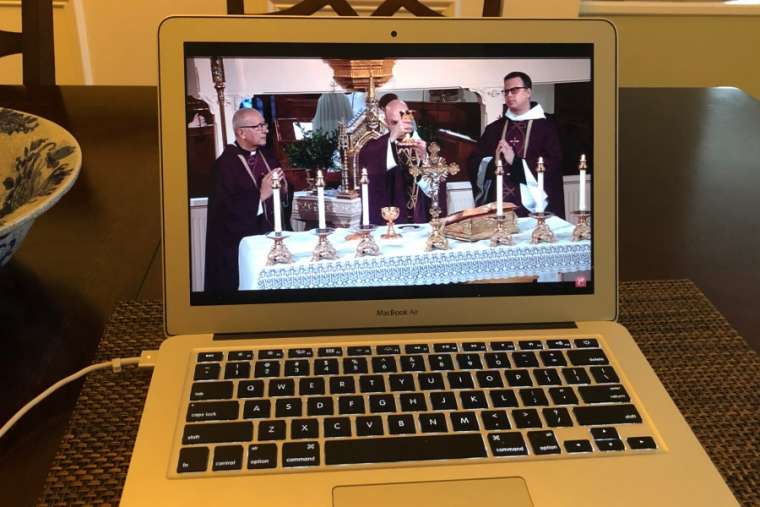
Now for the good news… Fr Bob Eccles reminds us of how the Holy Spirit unites us all in the Holy Eucharist, whether we can be physically present at Mass or not.
Many tax-collectors and sinners were also sitting with Jesus and his disciples, for there were many who followed him. When the scribes of the Pharisees saw it, they asked, Why does he eat with tax collectors and sinners?
The one they said ate and drank with sinners – and on occasion, so we are told in another place, even let a sinner wash his feet (because, of course, of being forgiven, otherwise she would not have shown so much love) – now welcomes us (because, of course, of being forgiven, so we can show our love, our love for him).
Beggars lame, and harlots also here,
Repentant publicans are drawing near,
Wayward sons come home without a fear,
God and man at table are sat down.
Why the Eucharist? So that he might come to us and make his home with us. So that he might dwell in our hearts through faith, our faith in him. But suppose we are prevented? Lockdowns or just prudence leave people at one remove from the Mass. In time of sickness whole communities can be unable to come. Of course there are those who seldom or never leave home anyway because of chronic illness or frailty, why we have the Mass kit ready in the sacristy, to take the Mass to them. We might open out that line of thought and look further, look out further from this gathering?
Believers can see into the sacraments to the reality of the Church, but it is not given to them to see all the members of the Church (Herbert McCabe, The New Creation). There are those who are united to the Church by links which are not made sacramentally visible even to the eye of faith. Besides the comparatively small group of people who are actually gathered at the Eucharistic meal there may be many more who are united to them invisibly, men and women who through no fault of theirs are absent from its sacramental enactment. Here the all-important principle to remember is that those with a will moved by divine grace sincerely desire to receive a sacrament, but are prevented from doing so, share fully in the ultimate effect of that sacrament, the growth of charity. Ubi caritas et amor Dei ibi est. We should particularly remember this when we think of the worship of other Christians. It is in their prayer and especially in their common prayer that they most fully express their invisible union with the sacramental Church.
In the second Eucharistic Prayer the Church prays, “may all of us who share in the body and blood of Christ be brought together in unity by the Holy Spirit”. The mystery of faith that is signified and brought about in the Eucharist is the unity of Christ’s followers in the spirit of charity. Can we share in the mystery of grace without celebrating the sacrament? Why yes. We can share in the Spirit, the mystery of grace, by our desire to receive the sacrament, even if the celebration is in some way prevented, even if the mystery of the Church is not enacted (because of not gathering in the name of Jesus, even in twos and threes).
We usually think of desire for the sacraments in connection with Baptism, the example being the unfortunate man who is always setting out to be baptised and is always being run over by a tram, or after Vatican 2 by a bus. Of course we believe that he has received his gift and met his Saviour. It is we who are commanded to celebrate the mystery of salvation through the discipline of the sacraments. In no way can this observance of ours set up boundaries or restrictions to the Lord and giver of life – whose Word does not return to him empty, but brings about what it was sent out to do.
They have given us a prayer to express desire for the Eucharist, for those at home. Isn’it it a tad diffident and lacking assurance? It has you pray, “come spiritually into my heart that I may embrace you as if you were already there.” Now spiritual isn’t to be opposed to sacramental. Or thought of as something somehow lesser. Life in Christ is ever spiritual, no-one can say Jesus is Lord except by the Holy Spirit. All is the work of the Spirit, all sacraments, all prayer. “As if you were already there?” “As if” sounds conditional, “as if” sounds like a work of the imagination, “as if” is uncertain, it’s neither yes or no. But in Christ it is never yes and no, in him it is always Yes. For in him, says the Apostle, every one of God’s promises is a Yes. It is our redeemer, friend and brother who has set in our hearts this deep desire for him to come to us and make his home in us, and he will answer that longing, without fail, he will. We may repeat with confidence and the assurance of faith the lovely words, “Lord, I am not worthy that you should enter under my roof, but only say the word and my soul shall be he
